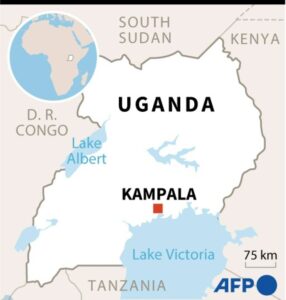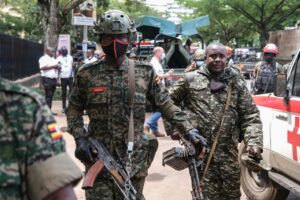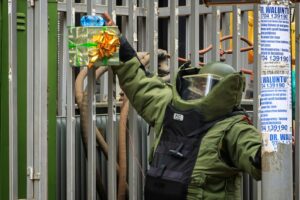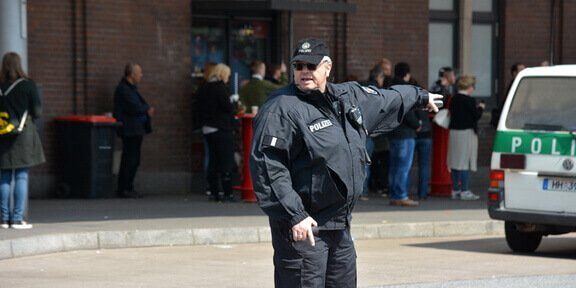Twin suicide bombings killed three people and wounded several dozen more in Uganda’s capital Kampala on Tuesday, police said as the Islamic State group claimed responsibility for the attacks.
The police earlier blamed the Allied Democratic Forces (ADF), an armed group active in eastern Democratic Republic of Congo blamed for a string of recent attacks in Uganda and which Washington has linked to IS.
Two suicide bombers on motorbikes — disguised as local “boda boda” motorcycle taxi drivers — detonated a device near the entrance to parliament, killing a passerby. A third attacker targeted a checkpoint near the central police station, killing two people, police spokesman Fred Enanga said.
The explosions in Kampala’s central business district occurred within minutes of each other, shortly after 10:00 am (0700 GMT), and left “bodies shattered and scattered”, he said.
Police foiled a third attack, recovering an improvised explosive device from the home of an alleged suicide bomber who was shot and wounded, Enanga added. They were in pursuit of other members of the group.
Ugandan President Yoweri Museveni said the man “later died” and vowed that the attackers “will perish”.
“The public should maintain vigilance of checking people at entry points to bus parks, hotels, churches, mosques, markets,” he said.
The blast near the police station shattered windows while the one near parliament set nearby parked cars on fire, Uganda’s Assistant Inspector General of police Edward Ochom told AFP earlier.
The Ugandan Red Cross said 21 of the 33 people wounded were police officers.
– ‘It was so loud’ –
The attacks follow two blasts last month — a bus explosion near Kampala that wounded many people and a bombing at a roadside eatery in the capital that killed one woman.
Police said both those explosions were carried out by the ADF.
Uganda has also blamed the group for a foiled bomb attack in August on the funeral of an army commander who led a major offensive against Al-Shabaab militants in Somalia.
Salim Uhuru, mayor of Kampala Central, told AFP he was near the police station when he heard the blast.
“It was so loud. I ran towards the police station and saw one policeman I know dead on the ground. His body was scattered like mincemeat,” Uhuru said.
Kyle Spencer, the executive director of Uganda’s Internet Exchange Point, told AFP the explosions had sparked panic.
“The road to parliament is closed off, there are people just crying, everyone else is just trying to get away from these areas,” he said.
Parliament cancelled its Tuesday session, asking members to avoid the area “as security forces are working hard to restore order”.
The premises were put under tight security, with heavily armed soldiers securing the area as forensics officers in white overalls inspected the blast site for clues.
Opposition leader Bobi Wine, whose real name is Robert Kyagulanyi, said he was “very sad” about the bombings. The African Union also condemned the attacks.
– ‘Jihadist influence’ –
Ugandan police last month arrested a number of alleged ADF operatives and warned that extremists were believed to be plotting a new attack on “major installations”.
“Today’s breakthrough attacks show that we still need to do more, to pre-empt, penetrate and prevent deadly attacks by domestic extremists in the days to come,” police spokesman Enanga said.
The ADF, historically a Ugandan rebel group, has been accused of killing thousands of civilians in eastern DRC.
“It’s increasingly clear that the ADF is refocusing its attention on Uganda,” said Kristof Titeca, an expert on the group at the University of Antwerp.
“It may link with an increased influence of jihadist elements within the ADF in the last couple of years,” he told AFP.
In April 2019, IS began to claim some ADF attacks on social media, presenting the group as its regional branch — the Islamic State Central Africa Province, or ISCAP.
In March this year, the United States officially linked the ADF to IS.
The ADF is considered by experts to be the bloodiest of more than 120 armed groups that roam eastern DRC, many of them a legacy of two regional wars a quarter of a century ago.
In 2010, twin bombings in Kampala targeting fans watching the World Cup final left 76 people dead, with Al-Shabaab claiming responsibility.
The attack was seen as revenge for Uganda sending troops to Somalia as part of an African Union mission to confront Al-Shabaab.
strs-sva-amu/ah/spm/lc











